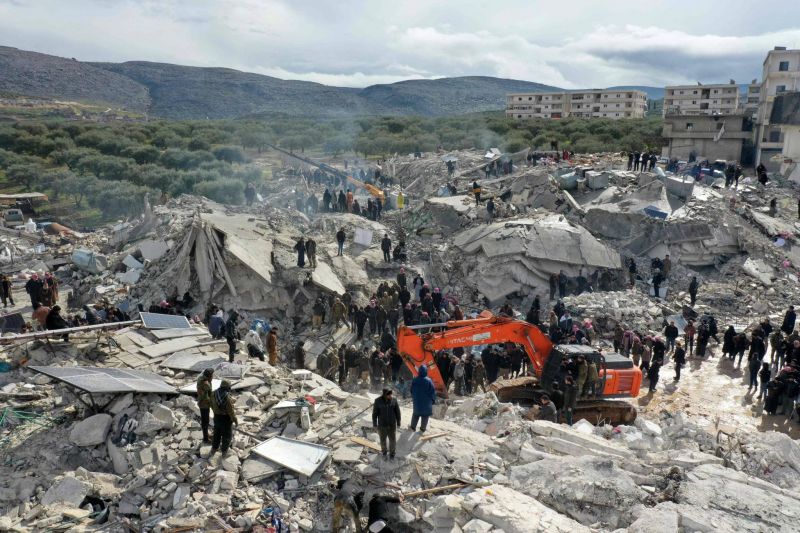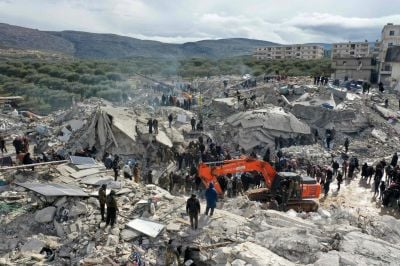
Image of desolation after the collapse of buildings in the village of Harim in the Idlib region. (Credit: Omar Haj Kaddour/AFP)
Mohammad* lived through it all: the height of the Syrian civil war, the siege of Aleppo, intense bombings, kidnappings, and torture at the hands of the Syrian government.
He managed to survive by fleeing from one town to the next. He witnessed hundreds of unidentified bodies arrive in the emergency rooms of hospitals, where he worked as a nurse.
But the night of Feb. 5, was something else. When the walls of his apartment shook from the earthquake, Mohammad’s blood ran cold. The fear he felt was unprecedented.
“This earthquake was worse than all the bombings we have suffered since the war broke out,” he said.
Located about 60 kilometers from the epicenter in Turkey, Syria was heavily hit by the massive earthquake.
The earthquake triggered the collapse of thousands of buildings— many of which were weakened by more than 11 years of war, while others were built hastily. While some buildings fell at the height of the tremors, others collapsed later in the day.
Originally from Aleppo, the war displaced Mohammad al-Dana, to a northwestern Syrian town near the Turkish border.
When the earthquake hit, he initially thought it was another round of bombing.
“I took my little ones to the car to take refuge,” Mohammad recounted. “Because of the shock, my two-month-pregnant wife is in a bad condition. She is in a maternity ward now, and she risks losing the baby.”
After ensuring his family was safe, Mohammad went to the city hospital where he works.
“We kept receiving seriously injured people, suffering from smashed skulls, severed legs,” Mohammad said. “It is not over yet, there are still people under the rubble.”
“The worst thing,” he added, “is that we don't have enough medical equipment or medicine to treat everyone.”
Areas bordering Turkey were hit hardest. Buildings in over 58 Syrian towns and villages, mainly in the northwest part of the country, were completely or partially destroyed.
The earthquake killed at least 1,600 people in Syria, according to a provisional death toll, although this number is expected to rise.
“This is the most difficult rescue operation ever,” Mounir al-Mustafa, deputy director of the White Helmets — a civil defense organization in northeastern Syria— told L’Orient-Le Jour.
Due to bad weather conditions and a lack of necessary resources, rescue workers are unable to reach all the affected towns and villages.
“Voices are heard under rubble here and there, and our teams are working hard to save those lives,” Mustafa said. “Hospitals are at their maximum capacity.”
The White Helmets called on the international community for aid, especially in the form of much-needed “heavy rescue equipment.”
“We stayed for hours in the rain; we didn’t dare go back home. The children are terrified,” said Ahmad, 29, who lives in a one-story house with 10 family members in the Idlib province.
Ahmad said he cannot forget the faces of his children, who were on the streets in their pajamas that dreadful night.
Among the photos of quake victims circulating on WhatsApp, Ahmed recognized a friend and his two-year-old daughter, both crushed under their collapsed apartment building.
‘Scared to death’
The Health Ministry in government-controlled areas of Syria estimated more than 1,315 people were injured in the cities of Latakia, Tartus, and Aleppo.
In Hamah, an eight-story building — home to over 125 residents — collapsed.
“We've had things like this happen to us, but this time I was really scared to death,” said Chouicar, a Homs resident contacted by L’Orient-Le Jour.
In the coastal city of Tartus, panic seized residents in the middle of the night.
“I was on duty when the closets started falling on us. Buildings collapsed in the neighborhood and we saw waves more than 10 meters high,” said Hicham,* a police officer in the city.
"It was raining cats and dogs; it was panic. People jumped into their cars in their pajamas and headed for the mountains for fear of a tsunami," he continued.
In Aleppo, Syria’s second-largest city, at least 46 buildings collapsed killing some 156 people, according to local authorities quoted by the Syrian state-owned news agency.
The General Directorate of Antiquities and Museums posted photos on Facebook showing damage incurred to the minaret of the Ayyubid mosque, the facade of the Ottoman hospice, and parts of the Aleppo citadel.
“We all thought the house was going to collapse on our heads. This is the fourth time we have left our house in a panic because of the aftershocks,” said Faya*, 21, from Qamishli in northeast Syria. “We have to be prepared for anything. We are living a real nightmare.”
In the Aleppo neighborhood of Azizieh, half of the six-story building where Maria* and her family live also collapsed.
“We were woken up with a start, shaken like in a merry-go-round,” she said. “I came across my next-door neighbor, her leg was broken and [she] was shouting ‘my family has fallen.’”
“We are devastated. We have lived through all the torments of the war and this crisis that consumes us day by day,” Maria said.
The part of the 6-story building that remains intact was evacuated by firemen. Rescue workers are still trying to find survivors using “shovels.”
“We don’t have electricity, no proper resources because of the terrible situation in Syria. The weight of economic sanctions is even worse for us than the bombings,” Maria said.
Maria said she can no longer access her apartment because it might collapse at any moment.
“I don't know how we're going to save what's left. Some Russian soldiers I met in the street just gave me some sugar and then left,” she said.
“Please help us.”
*First names have been changed. This article was originally published in French in L'Orient Le-Jour. Translation by Sahar Ghoussoub.
